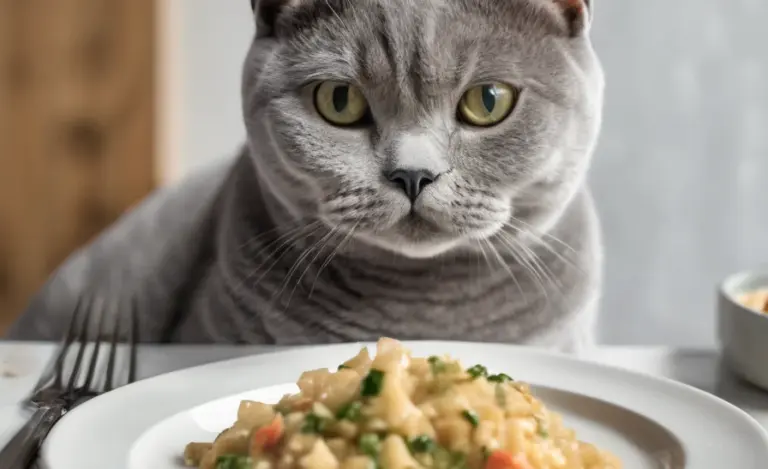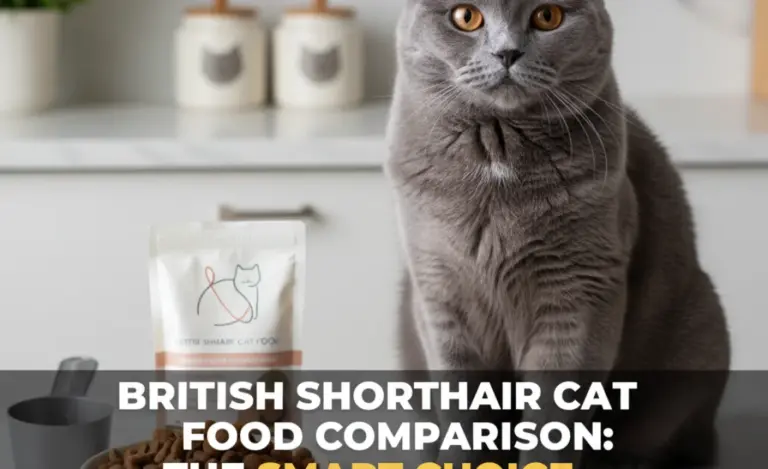British Shorthair Nutrition for Shiny Coat: Secret?
A shiny coat on your British Shorthair comes from a balanced diet rich in protein, healthy fats like Omega-3 and Omega-6, vitamins (especially A and E), and minerals. Choose high-quality cat food, consider supplements if needed, ensure fresh water is always available, and avoid overfeeding. Regular grooming also helps distribute natural oils for a healthy, glossy coat.
Is your British Shorthair’s coat looking a little dull? You’re not alone! Many owners wonder how to keep their beloved Brit’s fur soft, thick, and gleaming. A healthy, shiny coat isn’t just about looks; it’s a sign your cat is getting the right nutrients. Figuring out the best diet can feel overwhelming, but don’t worry! I’ll guide you through the essential elements of British Shorthair nutrition, step-by-step, so you can have your feline friend looking and feeling their best. We’ll cover everything from choosing the right food to adding helpful supplements and avoiding common pitfalls.
Understanding British Shorthair Nutritional Needs
British Shorthairs are known for their plush, dense coats, which are a breed hallmark. But that beautiful fur needs the right building blocks! Proper nutrition plays a vital role in maintaining a healthy, shiny coat. Let’s break down the key nutrients your British Shorthair needs.
Essential Nutrients for a Healthy Coat
Think of your cat’s diet as the fuel that powers their overall health and beauty. Here’s what to focus on:
- Protein: The foundation of a healthy coat. Protein supports hair growth and repair. Look for high-quality animal-based proteins like chicken, fish, or turkey.
- Fats: Essential for a glossy coat. Omega-3 and Omega-6 fatty acids are particularly important. These help moisturize the skin and coat from the inside out.
- Vitamins: Vitamin A is crucial for skin health, while Vitamin E acts as an antioxidant and supports coat shine.
- Minerals: Zinc and copper play a role in hair follicle health and coat pigmentation.
- Water: Often overlooked, hydration is key! Dehydration can lead to dry, brittle fur. Always provide fresh, clean water.
Why Quality Matters
Not all cat food is created equal. Cheaper brands often use fillers and low-quality ingredients that don’t provide the necessary nutrients. Investing in a high-quality cat food formulated for optimal health is one of the best things you can do for your British Shorthair’s coat.
According to the RSPCA, a complete and balanced diet is essential for your cat’s health and well-being.
Choosing the Right Cat Food
With so many options available, selecting the perfect cat food can feel daunting. Here’s a breakdown to help you navigate the choices.
Dry vs. Wet Food
Both dry and wet food have their pros and cons. Many owners choose to feed a combination of both.
- Dry Food: Convenient, affordable, and helps promote dental health. Look for kibble that’s rich in animal-based protein and low in carbohydrates.
- Wet Food: Higher moisture content, which can be beneficial for hydration. Often more palatable for picky eaters.
Reading Food Labels
Become a label detective! Here’s what to look for:
- Ingredient List: The first few ingredients should be animal-based protein sources.
- Guaranteed Analysis: Check the protein, fat, and fiber percentages.
- AAFCO Statement: Look for a statement from the Association of American Feed Control Officials (AAFCO) confirming that the food is complete and balanced for your cat’s life stage.
Recommended Food Brands
While every cat is different, here are a few reputable brands known for their high-quality ingredients:
- Royal Canin: Offers breed-specific formulas, including one for British Shorthairs.
- Purina Pro Plan: A popular choice with a wide range of formulas to suit different needs.
- Hill’s Science Diet: Known for their focus on scientific research and nutritional balance.
Supplementing Your Cat’s Diet
In some cases, supplements can help boost your British Shorthair’s coat health. However, it’s always best to consult with your veterinarian before adding any supplements to their diet.
Omega-3 and Omega-6 Fatty Acids
These essential fatty acids are crucial for a shiny coat. Fish oil supplements are a popular choice.
Vitamin E
Vitamin E is an antioxidant that can help protect the skin and coat from damage.
Biotin
Biotin, also known as Vitamin B7, contributes to healthy skin and coat.
Important Considerations When Supplementing
Keep these points in mind when considering supplements:
- Consult Your Vet: Get professional advice on the right supplements and dosage for your cat.
- Quality Matters: Choose reputable brands that use high-quality ingredients.
- Follow Dosage Instructions: Never exceed the recommended dosage.
The Importance of Hydration
Water is vital for every bodily function, including maintaining a healthy coat. Dehydration can lead to dry, brittle fur and other health problems.
Ensuring Adequate Water Intake
Here are some tips to encourage your British Shorthair to drink more water:
- Fresh Water Daily: Change the water bowl at least once a day.
- Multiple Water Stations: Place water bowls in different locations around the house.
- Water Fountain: Many cats prefer drinking from a circulating water fountain.
- Wet Food: Incorporating wet food into their diet can increase their overall water intake.
Grooming for a Shiny Coat
Nutrition is only one piece of the puzzle. Regular grooming is also essential for maintaining a healthy, shiny coat.
Brushing Techniques
Brushing helps remove loose hair, distribute natural oils, and stimulate blood circulation.
- Frequency: Brush your British Shorthair at least 2-3 times a week.
- Type of Brush: Use a slicker brush or a metal comb to remove loose hair and prevent mats.
- Gentle Approach: Be gentle and avoid pulling on their fur.
Bathing Your British Shorthair
British Shorthairs generally don’t need frequent baths. Over-bathing can strip their coat of natural oils.
- Frequency: Bathe only when necessary, such as when they get dirty or have fleas.
- Cat-Specific Shampoo: Use a shampoo specifically formulated for cats.
- Thorough Rinse: Rinse thoroughly to remove all traces of shampoo.
Common Dietary Mistakes to Avoid
Even with the best intentions, it’s easy to make dietary mistakes that can negatively impact your British Shorthair’s coat. Here are some common pitfalls to avoid:
Overfeeding
Obesity can lead to a variety of health problems, including skin and coat issues. Follow the feeding guidelines on the cat food label and adjust as needed based on your cat’s activity level and body condition.
Feeding Table Scraps
Human food is often too high in fat, salt, and sugar for cats. Some foods, like chocolate and onions, are toxic to cats.
Ignoring Food Allergies
Food allergies can manifest as skin problems, such as itching, redness, and hair loss. If you suspect your cat has a food allergy, consult with your veterinarian.
Inconsistent Diet
Sudden changes in diet can upset your cat’s digestive system and lead to coat problems. If you need to switch foods, do it gradually over a period of 7-10 days.
Addressing Specific Coat Problems
Sometimes, despite your best efforts, your British Shorthair may still experience coat problems. Here’s how to address some common issues:
Dull Coat
A dull coat can be a sign of nutrient deficiency. Review your cat’s diet and consider adding supplements.
Excessive Shedding
Some shedding is normal, but excessive shedding can be a sign of stress, allergies, or underlying health problems.
Dry, Flaky Skin
Dry skin can be caused by dehydration, low humidity, or a lack of essential fatty acids. Ensure your cat is drinking enough water and consider adding an omega-3 supplement.
Hair Loss
Hair loss can be a sign of allergies, parasites, or skin infections. Consult with your veterinarian to determine the underlying cause.
According to Cornell Feline Health Center, skin problems are a common reason for vet visits. Early detection and treatment can prevent more serious issues.
British Shorthair Nutrition for Shiny Coat: Step-by-Step Guide
Here’s a step-by-step guide to ensure your British Shorthair gets the nutrition they need for a shiny, healthy coat:
- Choose a High-Quality Cat Food: Select a food that is rich in animal-based protein, healthy fats, and essential vitamins and minerals.
- Read Food Labels Carefully: Pay attention to the ingredient list and guaranteed analysis.
- Provide Fresh Water Daily: Ensure your cat always has access to fresh, clean water.
- Consider Supplements: Talk to your veterinarian about adding omega-3 fatty acids, vitamin E, or biotin supplements.
- Groom Regularly: Brush your cat 2-3 times a week to remove loose hair and distribute natural oils.
- Avoid Overfeeding: Follow the feeding guidelines on the cat food label and adjust as needed.
- Monitor Your Cat’s Coat: Watch for any signs of dullness, dryness, or hair loss.
- Consult Your Veterinarian: If you have any concerns about your cat’s coat health, seek professional advice.
British Shorthair Nutrition for Shiny Coat: Dos and Don’ts
Here’s a quick reference table summarizing the dos and don’ts of British Shorthair nutrition for a shiny coat:
| Do | Don’t |
|---|---|
| Feed a high-quality cat food | Feed cheap, filler-filled food |
| Provide fresh water daily | Let your cat become dehydrated |
| Brush regularly | Neglect grooming |
| Consider supplements (with vet approval) | Over-supplement without professional advice |
| Monitor your cat’s coat health | Ignore coat problems |
| Consult your veterinarian | Self-diagnose and treat |
| Read food labels carefully | Ignore ingredient lists |
British Shorthair Nutrition for Shiny Coat: Diet Table
Here’s a sample diet table for a British Shorthair cat, adjust according to your cat’s weight and activity level. Consult your vet for precise quantities.
| Food Type | Amount | Frequency | Notes |
|---|---|---|---|
| High-Quality Dry Food | 1/2 – 3/4 cup | Divided into two meals | Choose a brand with high animal protein content |
| Wet Food | 1/4 – 1/2 can | Once a day | Can be mixed with dry food or given separately |
| Water | Unlimited | Available at all times | Use a fountain to encourage drinking |
| Omega-3 Supplement | As directed by veterinarian | Once a day | Add to food |
FAQ: British Shorthair Nutrition for Shiny Coat
Here are some frequently asked questions about British Shorthair nutrition and coat health:
- Q: What are the signs of a healthy coat in a British Shorthair?
- A: A healthy coat should be thick, soft, and shiny. The skin should be free of redness, flakes, and irritation.
- Q: How often should I feed my British Shorthair?
- A: Most adult British Shorthairs do well with two meals a day. Kittens need to be fed more frequently.
- Q: Can I give my British Shorthair treats?
- A: Treats are fine in moderation. Choose healthy treats that are low in calories and high in protein.
- Q: What should I do if my British Shorthair is a picky eater?
- A: Try offering different types of food, such as wet food or different flavors of dry food. You can also try warming the food slightly to make it more appealing. If your cat is consistently refusing food, consult with your veterinarian.
- Q: How long does it take to see improvements in my cat’s coat after changing their diet?
- A: It can take several weeks or even months to see noticeable improvements in your cat’s coat. Be patient and consistent with the new diet.
- Q: Is grain-free food better for my British Shorthair’s coat?
- A: Not necessarily. While some cats may benefit from a grain-free diet, it’s not essential for all cats. Focus on choosing a food that is high in animal-based protein and low in fillers, regardless of whether it contains grains.
- Q: What human foods are safe for British Shorthairs?
- A: Plain cooked chicken or fish without seasonings can be given as an occasional treat. However, human food should not make up a significant portion of their diet. Always avoid toxic foods like chocolate, onions, and grapes.
Conclusion
Achieving a shiny, healthy coat for your British Shorthair is a journey that combines proper nutrition with consistent grooming. By understanding the essential nutrients your cat needs, choosing the right food, and avoiding common dietary mistakes, you can help your feline friend look and feel their best. Remember that every cat is unique, so it’s important to work closely with your veterinarian to determine the best diet and care plan for your individual pet. With a little patience and dedication, you’ll be rewarded with a British Shorthair whose coat is as magnificent as their personality!




